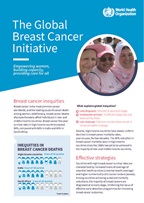
The Global Breast Cancer Initiative
Empowering women, building capacity, providing care for all
WHO / B. Anderson
New global breast cancer initiative
New global breast cancer initiative
©
Credits
GBCI: operational approach based on 3 pillars of action for national cancer control programmes
The World Health Organization’s Global Breast Cancer Initiative (GBCI), established in 2021, brings together stakeholders from around the world and across sectors with the joint goal of reducing global breast cancer mortality. GBCI employs 3 key strategies:
- health promotion for early detection,
- timely breast diagnosis, and
- comprehensive breast cancer management.
Pillar 1: Health promotion for early detection
Public health education to improve awareness of the signs and symptoms of breast cancer, risk reduction strategies (such as preventing and managing obesity, limiting alcohol intake and encouraging breastfeeding), and reducing any stigma associated with breast health.
Goal: >60% of invasive cancers are diagnosed at stage I or II
Goal: >60% of invasive cancers are diagnosed at stage I or II
Pillar 2: Timely breast diagnosis
Public and health worker education on signs and symptoms of early breast cancer so women are referred to diagnostic services when appropriate. Timely breast cancer diagnosis should reduce delays between the time a patient first interacts with the health system and the initiation of breast cancer treatment. Although breast tumours do not change in days or weeks, cancer survival rates begin to erode when delays to initiate treatment are greater than 3 months. Current delays in some settings and among certain vulnerable populations can be more than a year. Basic diagnostic services are feasible in all settings, so long as they are well-organized and lead to timely referral for specialist care.
Goal: diagnostic evaluation, imaging, tissue sampling and pathology within 60 days
Goal: diagnostic evaluation, imaging, tissue sampling and pathology within 60 days
Pillar 3: Comprehensive breast cancer management
Because cancer management requires some level of specialized care, establishing centralized services, treatment for breast cancer can be optimized. Comprehensive treatment and care for breast cancer treatment should include access to surgery, chemotherapy and/or radiotherapy as well as rehabilitation support for women following treatment and palliative services to reduce pain and discomfort.
Goal: >80% undergo multimodality treatment without abandonment
Goal: >80% undergo multimodality treatment without abandonment
Related publication

30 June 2022
The Global Breast Cancer Initiative (GBCI)
The Global Breast Cancer Initiative, established by WHO in 2021, will provide guidance to governments on health systems strengthening for breast cancer....

